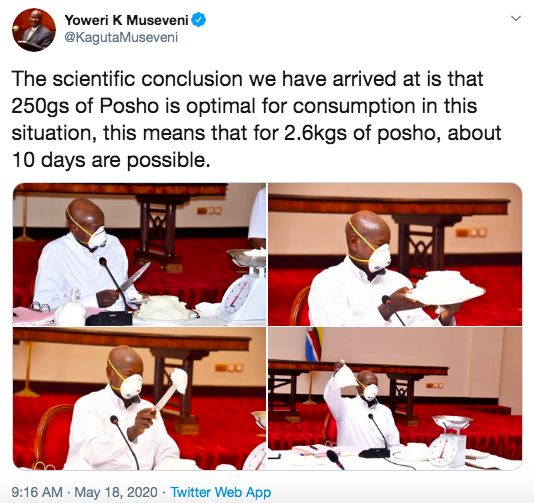In some ways Uganda’s response to the coronavirus pandemic has been remarkable. As of the writing of this piece on May 31st, Uganda has screened more than 96,000 people for COVID-19. Fewer than 500 of those have tested positive for the disease, and the country has yet to record a single death from the virus. Major publications such as The New Yorker and The Washington Post have singled out the Ugandan government for praise, reflecting that Western countries might do well to learn from its example. Such coverage is an important counterpoint to the doom-mongering coronavirus journalism that has predicted calamity in Africa for months now, and that manages to frame even the continent’s successes vis-à-vis the pandemic in a disparaging light. Nevertheless, much of the praise for Uganda’s containment of COVID-19 obscures grim complexities in the country’s pandemic response.
Uganda’s lockdown has included, among other things, a rigid curfew, the suspension of all public transit, and punishing restrictions on movement – with people banned from using even their private vehicles for transport. While certain food sellers have been allowed to remain in business, they could do so only provided that they camped out in markets, cut off from their families. The vast majority of the population, meanwhile, has been banned from any work whatsoever. In a country where millions live hand to mouth, the implications of such a prohibition are dire.
In the first days of the lockdown, as sources of income dried up and food prices skyrocketed (the price of salt, for example, quintupled in the final week of March), I received multiple panicked WhatsApp messages a day. “People are going to starve,” one friend wrote. “I fear hunger will get us before corona can,” lamented another.
When members of People Power, the political opposition movement headed by singer-turned-parliamentarian and presidential hopeful Robert Kyagulanyi (aka Bobi Wine), organized to provide food aid to households severely impacted by the lockdown, Museveni reacted by announcing that any politician found distributing food would be charged with attempted murder. The government then committed to distributing provisions itself, yet the aid they have provided falls drastically short of current need.
Museveni’s heavy-handed response to People Power’s aid efforts is itself indicative of another complexity of the lockdown. After more than three decades under Museveni’s rule, the Ugandan populace has in recent years increasingly chafed at the President’s grip. With opposition figures surging in popularity, and a presidential election scheduled for 2021, Museveni faces unprecedented challenges to his control over the country. The lockdown, however, has served as an opportunity to reassert his power over Ugandans.
It is telling, for instance, that state security is among the only sectors exempted from the constraints of the lockdown. Long viewed as an integral component of Museveni’s rule, Uganda’s military, police, and other state forces have been given largely free rein throughout the coronavirus crisis. They have taken to ruthlessly enforcing coronavirus containment measures through mass arrests, as well as violent – and, on more than one occasion, deadly – beatings and shootings. When Francis Zaake, a young parliamentarian and prominent member of the People Power movement defied Museveni by continuing to arrange food aid for his constituents, he was seized from his home, detained for ten days, and so brutally tortured that he ended up hospitalized and unable to see. Meanwhile, even as they are ordered to remain in their houses, some ordinary Ugandans still face government land grabs and evictions from their homes – as in the case of this village where, at the height of the lockdown, multiple families saw their homesteads burned to the ground by state forces.
Museveni, whose exact age is a matter of some dispute, but who admits to being at least 75 years old, is fond of referring to Ugandans as his bazukulu, or grandchildren. The designation not only enables him to cast a benevolent glow upon his often-brutal 34-year rule over a country with a median age of 16.7, but also gives him license to scold the Ugandan populace under the guise of offering concerned, grandfatherly advice. When criticism mounted over his regime’s coronavirus containment measures and the woeful inadequacy of governmental food aid during the lockdown, the President responded with a bizarre televised tutorial on how to divvy up a batch of posho – the maize-flour porridge that forms the staple of many Ugandan diets. The message was clear: in this moment of crisis, impoverished Ugandans weren’t suffering and going hungry because the government had abused their rights and failed to adequately provide for them; they were suffering and going hungry because they themselves had failed to responsibly portion their allotted food. As one Ugandan journalist ruefully observed, this lesson in responsible consumption came in a week when the President also quietly awarded bonuses of 40 million shillings each (~ €9690) to 317 members of parliament who had previously facilitated the removal of a presidential age limit from the Ugandan constitution. All of this played out less than two weeks after the IMF had granted Museveni’s government a $491.5 million loan intended to mitigate the economic impact of coronavirus control measures in Uganda.

